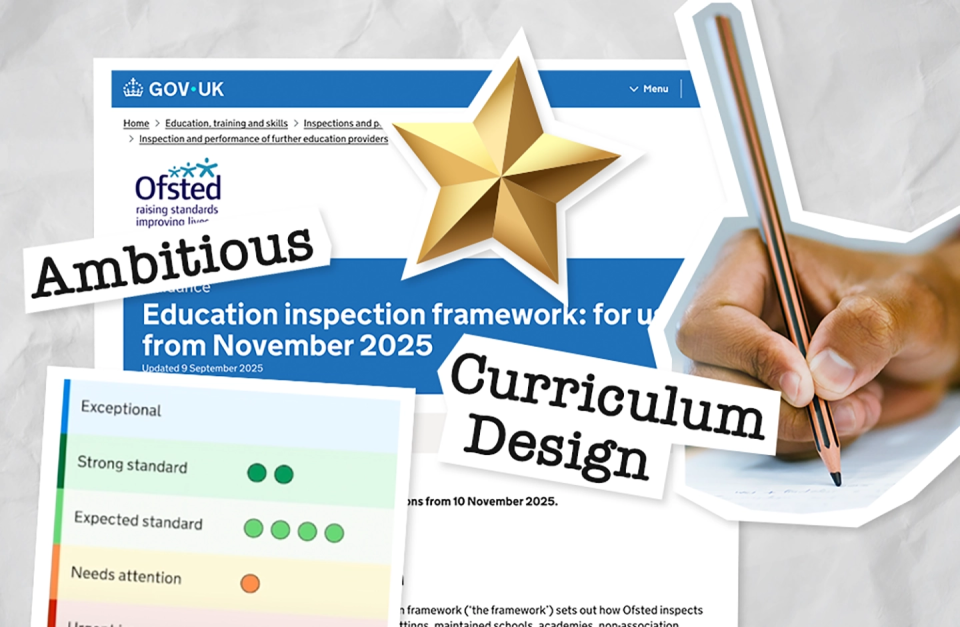By Melanie Moore
Ofsted have now released their new inspection framework, which will be used from 10 November 2025.
There are three core documents leaders need to be familiar with:
Before inspection
The operating guide explains what inspectors will do ahead of inspection. This now includes a two-part phone call: the initial conversation, followed by a longer call of around 30 minutes to discuss key aspects of the school. Details of these discussions are set out in the guide.
The new inspection areas
Ofsted’s inspection toolkit identifies seven areas of focus:
- Safeguarding – a stand-alone judgement of ‘met’ or ‘not met’.
- Inclusion – embedded as a ‘golden thread’ across all inspection areas.
- Curriculum and teaching.
- Achievement.
- Behaviour, attitudes and routines – including attendance.
- Children’s welfare and wellbeing.
- Leadership and governance.
Where appropriate for a particular setting, Early year and/or Post-16 provision will be a focus and inspectors will also consider them proportionally when grading each evaluation area.
The key priorities running through inspection will be safeguarding, inclusion, and leadership and governance – reflecting the expectation that these areas drive lasting improvement.
Equity and inclusion
This framework places fresh responsibility on leaders to design a high-quality curriculum that promotes equality and gives every pupil access to ambitious learning. Inspectors want to see a curriculum for all—broad, balanced, knowledge-rich, and sequenced to secure long-term learning. They will look closely at how the curriculum supports disadvantaged pupils, those with SEND, and others who face barriers, ensuring that these children experience the same breadth and depth of knowledge as their peers.
What Ofsted are looking for
Leaders will need to explain clearly:
- Curriculum intent: why the curriculum is structured the way it is, and how it meets the needs of every pupil.
- Ambition for all: how the curriculum is stretching and inclusive, not just suited to pupils who learn quickly.
- Adaptation, not narrowing: how provision for pupils with additional needs supports them without lowering expectations.
- Progression: how knowledge and skills build over time to give every pupil the best chance to succeed.
In short, inspectors want evidence that the curriculum is ambitious, inclusive and equitable.
You can read the full Ofsted inspection toolkit on GOV.UK.
How Ofsted combines curriculum and teaching
The new curriculum and teaching evaluation area brings together curriculum, teaching, and formative assessment. Inspectors no longer view teaching in isolation. Instead, they will ask:
- Intent – Is the curriculum ambitious, coherent, and designed to build knowledge and cultural capital for all pupils, including those with SEND or disadvantage?
- Implementation – How well do teachers deliver the curriculum in practice? Do they have expert knowledge, explain clearly, build on prior knowledge, adapt lessons, and use assessment effectively to inform teaching and learning?
Inspectors will also check that adaptations for vulnerable groups don’t lower expectations or reduce the breadth of the curriculum.
How Cornerstones can help
At Cornerstones, we have always championed the idea of an ambitious curriculum that sparks curiosity and supports deep understanding. Our curriculum framework and projects are fully mapped to the national curriculum, sequenced for progression, and adaptable to different school contexts.
What makes us different is our team of curriculum advisers, who work directly with schools to help leaders articulate their curriculum intent and evidence how projects form a coherent whole. For schools preparing for Ofsted, this support is often invaluable.
An example for SEND
One common concern for leaders is ensuring that a curriculum for all doesn’t mean lowering expectations. Take, for example, our Year 3 project on prehistoric Britain. In mainstream classrooms, pupils might investigate archaeological evidence, write non-chronological reports, and compare tools from different periods.
For pupils with SEND, the same knowledge can be taught using multisensory approaches—handling replica artefacts, sequencing images, using sentence scaffolds, or exploring vocabulary through role play. The curriculum content remains ambitious, but the pedagogy is adapted.
This flexible approach is one reason the Cornerstones Curriculum is already used successfully in special schools across the UK, where teachers adapt projects creatively for a wide range of abilities. It shows that an ambitious curriculum isn’t about doing more, but about doing what matters in ways that enable every child to succeed.
Moving forward with confidence
Designing a curriculum that is ambitious, inclusive, and adaptable is a complex task. Many leaders therefore choose to work with Cornerstones. Our projects, progression frameworks, and online platform Maestro provide a secure foundation, while our advisers offer personalised support to help schools refine and articulate their curriculum intent.
With the right tools and guidance, leaders can confidently show Ofsted—and most importantly their pupils—that they are delivering a high-quality curriculum that truly is ambitious for all.
Book a demo today!
To find out how the Cornerstones curriculum and Maestro functionality can help your school with the changes in the new Ofsted inspection framework, book a demo with one of our curriculum advisers.


